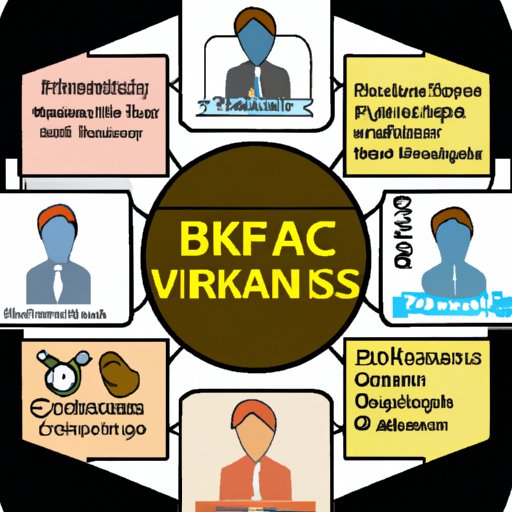Introduction
A financial advisor is a professional who provides advice to clients on matters related to their finances, such as investments, insurance, taxes, retirement planning, and estate planning. Becoming a financial advisor at a bank requires a combination of education, experience, and certifications. In this article, we will provide a comprehensive guide on how to become a financial advisor at a bank.
Research the Qualifications and Credentials Necessary to Become a Financial Advisor at a Bank
The first step to becoming a financial advisor at a bank is to research the qualifications and credentials necessary for the job. This includes understanding the educational requirements, licensure and certification requirements, and other qualifications that may be required by the bank.
Educational Requirements
Most banks require financial advisors to have at least a bachelor’s degree in finance, economics, accounting, or a related field. Some employers may also prefer candidates with an MBA or other advanced degree in finance or economics. Additionally, many banks require their financial advisors to have completed the Series 7 and Series 63 exams, which are administered by the Financial Industry Regulatory Authority (FINRA).
Licensure and Certification Requirements
In addition to educational requirements, most banks require their financial advisors to be licensed and/or certified. This usually involves completing the Series 7 and Series 63 exams mentioned above, as well as any state-specific licensure requirements. Additionally, most banks require their financial advisors to hold one or more professional certifications, such as the Certified Financial Planner (CFP) or Chartered Financial Analyst (CFA).
Gain Experience in Banking, Finance, or Investments
In order to become a financial advisor at a bank, you must have a thorough understanding of the banking industry and the various financial products offered by banks. To gain this knowledge, you should seek out opportunities to gain experience in banking, finance, or investments.
Develop an Understanding of the Banking Industry
It is important to develop an understanding of the banking industry, including the different types of banks and the services they offer. You can do this by reading books, articles, and industry reports on banking, attending seminars and conferences, or shadowing experienced professionals in the banking industry.
Learn About Different Types of Financial Products Offered by Banks
Once you have a basic understanding of the banking industry, it is important to learn about the different types of financial products offered by banks, such as investment accounts, loans, mortgages, and insurance. You should also familiarize yourself with the regulations and laws governing the banking industry. You can do this by researching online, attending seminars and conferences, or speaking with experienced professionals in the banking industry.

Network with Professionals in the Banking Industry
Networking is an essential part of becoming a financial advisor at a bank. By making connections with existing financial advisors, you can gain insight into the day-to-day operations of the job and find potential mentors who can help guide you through the process of becoming a financial advisor.
Attend Professional Events and Conferences
One way to network with professionals in the banking industry is by attending professional events and conferences. These events are often hosted by industry associations or organizations and provide excellent opportunities to meet and connect with experienced financial advisors. Additionally, these events are great places to learn about current trends in the banking industry and stay up-to-date on regulatory changes.
Make Connections with Existing Financial Advisors
Making connections with existing financial advisors is another great way to network and gain insight into the profession. You can reach out to existing financial advisors by attending local events, joining industry forums and discussion boards, or simply asking for referrals from friends and family. Additionally, you can use social media platforms such as LinkedIn to connect with financial advisors in your area.
Obtain Relevant Certifications
Most banks require their financial advisors to hold at least one professional certification. The two most common certifications for financial advisors are the Certified Financial Planner (CFP) and the Chartered Financial Analyst (CFA). Both of these certifications require passing an exam and meeting certain experience requirements.
Certified Financial Planner (CFP)
The CFP certification is the most widely recognized certification for financial advisors. This certification requires passing the CFP exam, which covers topics such as financial planning, risk management, investment strategies, taxation, and retirement planning. Additionally, applicants must have three years of full-time experience in the financial services industry before they can apply for the CFP designation.
Chartered Financial Analyst (CFA)
The CFA certification is another widely recognized certification for financial advisors. This certification requires passing the CFA exam, which covers topics such as investment analysis, portfolio management, and financial reporting. Additionally, applicants must have four years of relevant work experience before they can apply for the CFA designation.

Develop an Understanding of Legal and Ethical Responsibilities
In addition to the qualifications and certifications mentioned above, it is important for financial advisors to understand their legal and ethical responsibilities. This includes understanding compliance and regulatory requirements, as well as adhering to ethical standards of practice.
Compliance and Regulatory Requirements
Financial advisors must be aware of the various regulations and laws governing the banking industry. This includes federal laws such as the Securities Exchange Act of 1934 and the Investment Advisers Act of 1940, as well as state laws and regulations. Additionally, financial advisors must also be aware of the rules and regulations of FINRA and the Financial Industry Regulatory Authority (FINRA).
Ethics and Professionalism
Financial advisors must also adhere to ethical standards of practice. This includes acting in the best interests of their clients, maintaining confidentiality, avoiding conflicts of interest, and providing accurate and truthful information. Additionally, financial advisors must always maintain a professional demeanor and treat their clients with respect.
Conclusion
Becoming a financial advisor at a bank requires a combination of education, experience, and certifications. To become a financial advisor at a bank, you must research the qualifications and credentials necessary for the job, gain experience in banking, finance, or investments, network with professionals in the banking industry, obtain relevant certifications, and develop an understanding of legal and ethical responsibilities. With the right qualifications and dedication, anyone can become a financial advisor at a bank.
(Note: Is this article not meeting your expectations? Do you have knowledge or insights to share? Unlock new opportunities and expand your reach by joining our authors team. Click Registration to join us and share your expertise with our readers.)
